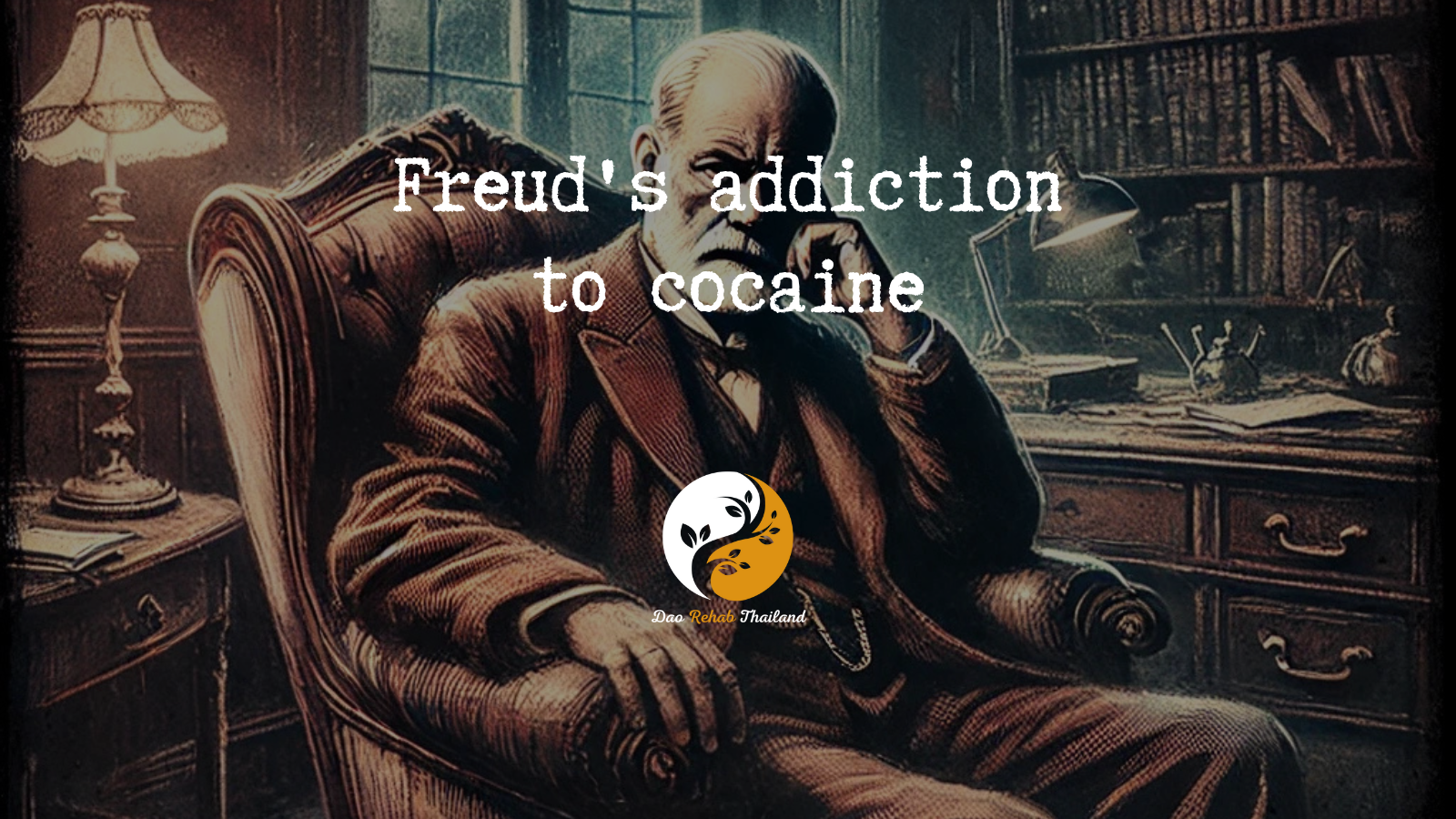
Freud’s addiction to cocaine
Freud's Cocaine Addiction
“Turning the impossible into possible”

"Detox from Drugs at a Luxury Holistic Center in Thailand and Israel"

Freud's Cocaine Addiction: A Historical Overview
Sigmund Freud, the founder of psychoanalysis, was one of the first to show scientific interest in cocaine, and his experience with the substance remains one of the more controversial chapters of his life. During the 1880s, before the harmful effects of cocaine were widely understood, Freud viewed it as a potential treatment for a range of medical and psychological issues. Here is an overview of Freud’s relationship with cocaine and its implications:
"Holistic Center for Trauma, Addiction, and Mental Imbalance Treatment in Thailand"
“Come to the beginning of your journey to freedom from addiction to alcohol, drugs, and pills, and rediscover your life within the serene embrace of DaoTherapy Rehab in Thailand—where holistic healing meets empowering recovery.”
DaoTherapy Holistic Rehab
Key Elements of Drugs Detox:
Medical Supervision: Drugs detox must be conducted under medical supervision, as the body may experience withdrawal symptoms. These can include nausea, anxiety, muscle aches, and insomnia. A medical team will monitor and manage these symptoms to ensure the patient’s safety and comfort.
Holistic Therapies:
Holistic Therapies: Many detox programs incorporate holistic therapies such as mindfulness, yoga, and meditation to help individuals cope with stress and anxiety during the detox process. These therapies support the mind-body connection and contribute to overall recovery.
Tapering Process
Tapering Process: Drugs detox often involves a gradual tapering of the drug to reduce withdrawal severity. Doctors will slowly decrease the dosage over time to allow the body to adjust to lower levels of the substance.
Psychological Support:
Psychological Support: Like any addiction recovery process, detox from Drugs includes psychological support. This can involve counseling, therapy, or support groups to address the mental and emotional aspects of addiction.
Post-Detox Treatment:
Post-Detox Treatment: After completing detox, continuing treatment is crucial to prevent relapse. This often includes participation in ongoing therapy, group support, and the development of new coping strategies to maintain sobriety.
Freud’s Initial Interest in Cocaine
In 1884, Freud began studying cocaine as part of his scientific curiosity and pursuit of innovation. He regarded it as a “wonder drug” that could alleviate conditions like depression, fatigue, and neurological diseases. At the time, cocaine use was legal, widespread, and considered a legitimate treatment prescribed by doctors and marketed by pharmaceutical companies.
Freud personally experimented with cocaine and enthusiastically wrote about its benefits in an article titled “Über Coca” (“On Coca”), in which he described the drug’s positive effects. He believed that cocaine could boost energy, enhance mood, and relieve anxiety and depression. Freud even shared it with friends and saw it as a tool for improving mental performance.
Cocaine as a Treatment for Addiction
One of Freud’s most notable experiments with cocaine was his attempt to use it as a treatment for morphine addiction. His close friend, Dr. Ernst von Fleischl-Marxow, had become addicted to morphine due to chronic pain. Freud hypothesized that cocaine could serve as a safe substitute for morphine. However, the experiment ended in failure: Fleischl-Marxow developed a severe dependence on cocaine and experienced significant adverse effects until his death. This outcome marked a serious blow to Freud’s efforts to promote the drug as a treatment.
Freud’s Personal Use and Possible Addiction
While there is no definitive evidence that Freud was addicted to cocaine, it is clear that he used it personally, not just for research purposes. He reported feelings of euphoria and relief after taking it and recommended it to others. However, over time, he seems to have reduced his use, likely due to the growing awareness of the drug’s dangers and its potential for dependence.
Criticism and Controversy
Freud’s enthusiasm for cocaine, particularly its connection to the failed treatment of Fleischl-Marxow, attracted significant criticism from his contemporaries. The case became an embarrassing episode in Freud’s scientific career, and he rarely referred to cocaine in his later works. Nevertheless, some argue that his early experiments with cocaine influenced his deeper understanding of the human psyche, particularly regarding desires, drives, and compulsive behaviors.
Historical Impact
Although Freud abandoned cocaine early in his career, the episode highlights the intersection of scientific inquiry, personal experimentation, and the use of psychoactive substances in an era of limited knowledge. Freud’s story with cocaine underscores the risks associated with therapeutic applications of substances when their full effects and consequences are not yet understood.
If you’d like to delve further into this topic or connect it to broader discussions on addiction or psychoanalysis, feel free to ask!

contact us
Contact us with your questions
We would love to speak with you! Feel free to reach out with any questions.

get in touch
Schedule a free consultation
Schedule a free consultation with our team and let’s make things happen!
Summary of Sigmund Freud's "Über Coca" ("On Coca"):
Background:
Published in 1884, “Über Coca” is one of Freud’s early articles, written during his initial exploration of cocaine. At the time, cocaine was legal and considered a promising treatment for various medical and psychological issues. Drawn to scientific innovation, Freud regarded cocaine as a “miracle drug” that could help address conditions such as depression, fatigue, nervous disorders, and other medical problems.
Main Content:
Description of Cocaine and Its Effects: In his article, Freud presented cocaine as a substance capable of acting as both a mental and physical stimulant. He described its effects as mood-enhancing and fatigue-relieving, noting that it could be both stimulating and calming, depending on the dose and the individual’s condition.
Therapeutic Potential: Freud believed cocaine had great therapeutic value. He saw it as a safer alternative to dangerous painkillers like morphine and suggested it could assist in treating addiction to such substances. He recommended its use for conditions including depression, neurological disorders, asthma, and digestive issues.
Personal Use: Freud personally experimented with cocaine and reported feelings of liberation and energy following its use. He shared his findings with colleagues and friends, including Dr. Ernst von Fleischl-Marxow, who attempted to use cocaine as a substitute for morphine but developed a severe dependency.
Initial Enthusiasm and Limitations: Freud expressed considerable enthusiasm for cocaine’s potential in the early stages of his research. However, his article did not address the negative aspects of the drug, as its addictive properties and harmful effects were not yet widely recognized.
Impact and Consequences:
Medical Failure: Freud’s attempt to use cocaine as a treatment for morphine addiction, particularly in the case of Fleischl-Marxow, ended in failure. His friend developed a severe addiction to cocaine, leading to immense suffering and eventual death. This incident brought significant criticism to Freud and tarnished his advocacy for cocaine as a therapeutic substance.
Career Stigma: The publication of “Über Coca” became a controversial episode in Freud’s scientific career. Due to the failures and criticisms associated with cocaine, Freud abandoned its use and refrained from discussing it in his later works.
Scientific Contribution: Despite its naivety, Freud’s research on cocaine was pioneering for its time. It contributed to early understanding of the effects of psychoactive substances and opened broader scientific discussions about their potential uses and risks.
Summary:
“Über Coca” reflects Freud’s initial optimistic outlook on cocaine as a therapeutic agent. The article reveals his enthusiasm for innovation and his willingness to personally test the substances he studied. However, the negative consequences of cocaine, which became apparent later, led Freud to distance himself from the subject. Today, “Über Coca” is viewed more as a historical artifact of Freud’s early scientific journey than as a major contribution to psychoanalysis or medicine.
Freud's Cocaine Use: Duration and Extent
Sigmund Freud actively used cocaine primarily during the 1880s, particularly between 1884 and 1887. During this period, he not only researched the substance but also personally experimented with it, believing that its benefits outweighed the risks, which were not yet fully understood at the time. Below is a detailed overview of Freud’s cocaine use:
Freud’s Personal Use:
Beginning of Use (1884): Freud began using cocaine when he decided to explore its medical and psychological potential. He tried it on himself to experience its effects firsthand. Freud reported feelings of euphoria, improved mood, and relief from fatigue, and he believed the substance was safe and posed minimal risks.
Sharing with Others: During this period, Freud not only used cocaine himself but also shared it with friends and colleagues, convinced of its benefits. The most notable case was that of Dr. Ernst von Fleischl-Marxow, who attempted to use cocaine as a substitute for morphine but developed a severe dependency that worsened his health.
Decline in Use (1887): Over time, the harmful effects of cocaine, including its addictive potential, became more apparent. Freud likely reduced his personal use around 1887, following the failure of Fleischl-Marxow’s treatment and the significant criticism he faced. His attitude toward the substance became more cautious.
Extent of Use:
- There is no definitive evidence that Freud was “addicted” to cocaine, but he used it fairly frequently during his early research period.
- Freud appears to have used cocaine primarily as a stimulant to enhance energy and mood rather than due to compulsive cravings.
- After 1887, Freud rarely addressed the topic of cocaine in his writings and distanced himself from it, likely due to the controversies and failures associated with its use.
Impact on His Work:
Although Freud abandoned cocaine, his experiences with it indirectly influenced his later work:
- His early insights into drives, desires, and compulsive behaviors may have been informed by his personal experimentation with the substance.
- The incident with Fleischl-Marxow and the failure to treat him effectively provided Freud with an important lesson about scientific responsibility and caution when using unproven substances.
Summary:
Freud used cocaine for a few brief years in the mid-1880s, primarily for personal and professional research purposes. While he ultimately abandoned the substance, its influence on his life and career remains a controversial but intriguing chapter in his story.
If you’d like further details, feel free to ask!








